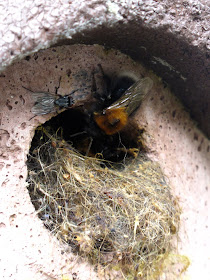In July 2005 I reported the first B. hypnorum in Hull and I have recorded it every year since. In the UK B. hypnorum has expanded steadily through most of England - click here for the 2009 records - and it appears that its status as a British bumblebee is consolidated.
It nests in trees, often in nest-boxes and also in roofs and while foraging, it has a preference for high flowers. The bumblebee is found from March until September. These are the flowers I have observed it foraging:
March: Mahonia
April: Cherry
May: Rowan, Comfrey, Cotoneaster horizontalis
June: Bramble, Deutzia, Cotoneaster, Comfrey, Angelica, Hebe, Snowberry bush
July: Teasel, Cotoneaster, Lavender, Hebe
August: Snowberry bush, Buddleia
September: Ceanothus
The first recorded B. hypnorum in Hull
The entrance to a B. hypnorum nest in a nest box. Flies appear to be always at the entrance.
BWARS gallery page for B. hypnorum here. You can also send your records to BWARS.
First B. hypnorum record by Dave Goulson and Paul Williams here.




I have seen that bee
ReplyDeletenoticed the black "eye"
on its body
lovely photo
too bad it was dying...but how did you know that ?
Beautiful bee. Wish they were all that easy to ID!
ReplyDeleteSuz, the one in the photo is the one I saw in 2005; the one I saw had most of its internal organs spilling out of its body, so I thought the photo was a bit too gory for showing.
ReplyDeleteI find it is a really handsome bumblebee too!